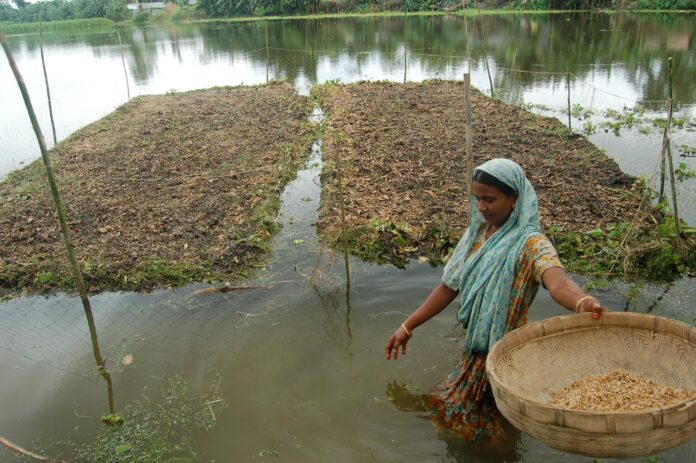Climate change has proven to be devastating for Bangladesh. With a sub-tropical monsoon climate, Bangladesh experiences annual seasonal flooding from June to September. This natural phenomenon, though challenging, is vital for the country’s ecosystem and economy. However, global warming is changing the region’s landscape. Rising sea levels, extreme natural disasters, and an increase in soil salinity all pose hardships for the agricultural community.
Women in Bangladesh, however, are particularly vulnerable given their lack of financial capacity to become climate resilient. This is in part due to insufficient foreign climate finance – finance drawn from international private, public and alternative sources to support climate change mitigation and adaptation efforts. Fundamental flaws within the current climate finance model systematically trap poor people, in particular women, in a cycle of debt. Bangladesh’s women contribute significantly to the country’s food security, constituting more than 70% of the country’s agriculture sector. Climate justice for Bangladesh must include empowering its women by establishing a grants-based climate finance system that is informed through a gender-equity lens.
In 2009, industrialized nations promised to collectively provide $100 billion USD annually to developing nations for climate adaptation and mitigation. This commitment has gone mainly unmet. A report by Oxfam estimates that between 2019-20, 73% of climate finance provided by rich nations was in the form of loans, with a significant amount (42%) of high-interest, non-concessional loans. Consequently, rural Bangladeshi families spend more than $2 billion USD every year on climate adaptation. With COP 28 commencing this week in the United Arab Emirates, rich nations must prioritize the urgent provision of gender-equitable climate finance to developing nations bearing the brunt of the climate crisis, in particular Bangladesh, to avert serious implications of loss and damage.
Bangladesh’s Women Fighting Climate Change
Climate adaptation is costly. Despite Bangladesh’s minimal carbon emissions, her people are forced to take out loans to cope with an ecological crisis they did not cause. Given the severe consequences of the changing climate, Bangladeshi farmers are looking for alternatives to continue earning livelihoods. This even includes farming saline-tolerant shrimp instead of traditional rice and vegetable varieties. However, converting rice paddies or other crop fields to aquaculture is expensive and complicated, especially for women, given their limited financial capacity.
Despite these challenges, Bangladeshi women are fighting back with resilience. Shefali Begum, a resourceful Bangladeshi woman from Sundarbans in the southwest of Bangladesh, devised a creative technique to deal with excessive moisture and soil salinity in her area region. Her method involved setting up cement rings in areas with high moisture levels which were then filled with salt-free soil enriched with organic waste. This technique helped regulate water levels, preventing the crops from drying up or becoming excessively inundated.
Many Bangladeshi women have contributed to the revival of an age-old traditional cultivation method known as Baira, which involves the creation of floating vegetable gardens made of buoyant hyacinth, paddy stalks, and other weeds. They use these materials to construct rafts or organic beds, beating them into shape and forming floating gardens. These gardens are then placed in flooded parts of the villages, taking advantage of the rising water levels.
Colonial Legacy & Dismantling of the Waqf System
The irony lies in the historical colonial exploitation of the Indian subcontinent, including today’s Bangladesh, where Britain plundered almost $45 trillion between 1765 and 1938. This history of colonial resource depletion is further exacerbated today through a brutal system of climate finance comprised primarily of high-interest, non-concessional loans. The result is a perpetual cycle of gendered economic inequity amongst climate-vulnerable Bangladeshi women who spend double their average incomes compared to men to protect themselves from global warming.
The harmful legacy of colonialism has also unravelled on another front. Before the colonization of the Indian subcontinent, the Islamic system of Waqf served as a critical instrument of poverty alleviation in Bangladesh—whereby property was donated in perpetuity for charitable objectives and community interests such as agriculture, education, and healthcare. Waqf not only contributed towards human welfare but also preserved nature while doing so, given its core principles of sustainable development, green economy, and green finance.
With the arrival of British colonial rule in the mid-18th century, controlling land and property became a central concern for colonial authorities, resulting in a series of changes that led to the dismantling of the Waqf system that thrived before colonization. This colonial injustice adversely impacts climate-vulnerable Bangladeshi women and families who would have previously benefitted from the Waqf system; instead, today, they have to rely on high-interest loans to protect themselves from climate change.
The Urgent Need for Gender-Informed Climate Finance
Another aggravating aspect of the current system of climate finance is its lack of gender-informed objectives required to ensure gender equity and women-empowerment for just and inclusive climate action. In some cases, climate finance harms communities instead of benefitting them by increasing their debt burdens, tragically leading to incidents of suicide of indebted beneficiaries.
To fulfill the urgent need for just climate action, a paradigm shift is necessary for climate finance. Communities and people are being forced into debt to recover from a climate crisis they did not start. Industrialized countries must adopt a fairer approach to climate finance: reparations-based, comprising grants and gender-equal. Additionally, climate finance for Bangladesh must propel gender equity and women’s empowerment as its core objective; expanding Bangladeshi women’s access to equitable financial resources will increase agricultural production and food security in their communities and advance their urgently needed contributions toward climate resilience.



